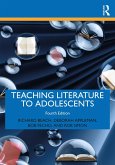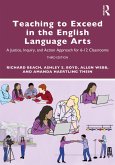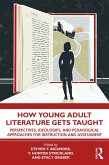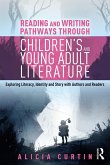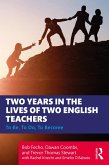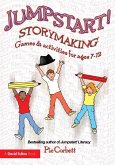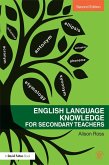Dieser Download kann aus rechtlichen Gründen nur mit Rechnungsadresse in A, B, BG, CY, CZ, D, DK, EW, E, FIN, F, GR, HR, H, IRL, I, LT, L, LR, M, NL, PL, P, R, S, SLO, SK ausgeliefert werden.
"The volume's critical sociocultural approach to teaching literature is exactly what's needed in this era of high-stakes testing and accountability. Here, the spirit of literature as exploration is revivified through real-world examples and methods to help secondary students not only find meaning in the texts they're reading, but to engage compelling aspects of politics, identity, and agency as they do."
Review #2: Russell E. Greinke, Associate Professor of English, University of Central Missouri, USA.
"Here is why I use the BAFS book (that is how I abbreviate it on my syllabus): Other YA lit texts typically arrange chapters around subjects such as contemporary realistic fiction, historical fiction, biography, adventure, etc. I prefer topics such as reading, responding, evaluating, and assessing, so I am not stuck assigning books from rigid categories like "biography." I like those straight-talking teacher vignettes, e.g., p. 3."
[I would consider buying the fourth edition]. Consider a condensed version, though. The students need to spend most of the semester reading YA lit and planning how to teach specific works. To give thorough coverage to all 12 chapters of BAFS is a huge time bite."
Review #3: Sabrina Jones, English Instructor, Marshall University, USA.
"There are some things I really like about this text. First, it emphasizes multiliteracy, and thus teaching a variety of literature types. It has activities for teaching social issues through YA fiction and using that as a vehicle for promoting action. This is very empowering for students. There's also a fresh focus on digital media literacy. As technology grows, it is very important that teachers are able to grow with it and incorporate it in the classroom. I
particularly love the detailed use of lesson plans and classroom-ready activities in chapters 8 and 9. I would like to see more of this in other chapters."
Review #4: David Bowles, Assistant Professor, University of Texas Río Grande Valley, USA.
"The attitude of the authors/editors toward students' diversity-both demographic and in terms of reading/learning-is a powerful antidote to the overreliance on canon that they have experienced in other English courses. And the chapters are written in a style that eschews convoluted, academic-sounding prose for accessible and forthright discussions of the issues. Finally, to reiterate a point I made above, the immediate application of concepts in the form of lesson plans at the end of chapters is pretty fantastic."



